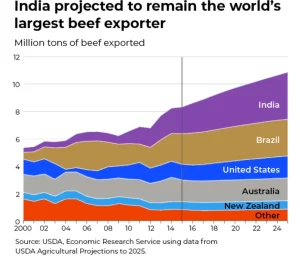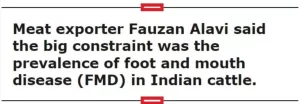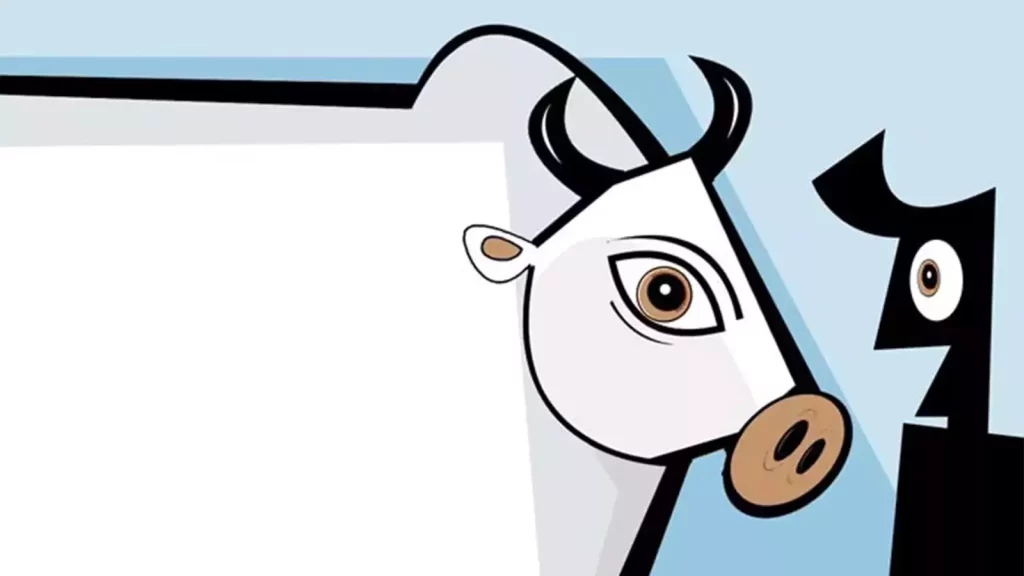Synopsis
BJP has changed its stance on buffalo meat exports, impacting the industry, especially in the context of vigilante attacks on cattle traders accused of transporting cows for slaughter.
What has been one of the most surprising events of Narendra Modi’s ten-year rule? BJP’s conversion from an opponent to supporter of buffalo meat exports.
In the initial years, there were reports of attacks by vigilantes on cattle traders accused of transporting cows for slaughter, often wrongly. The problem gathered steam as Uttar Pradesh moved towards its 2017 state election.

BJP won easily. As chief minister, Yogi Adityanath, a renowned cow lover, immediately cracked down on illegal slaughterhouses, even though these did not slaughter cows but buffaloes. Although every municipality was required by law to licence slaughterhouses for local consumption, some had failed to issue licences for years and so the void was filled by illegal ones.
Attacks by vigilantes shrank supplies of animals. Especially hard hit were buffalo meat slaughterhouses licensed for 100% exports. These had spearheaded an export boom, with exports touching a peak of $4.7 billion in 2014-15. These factories conformed to international physio-sanitary standards to qualify for entry into importing countries, which imposed rigorous checks. Some illegal slaughterhouses violated sanitary norms, but not the meat exporters.
Yet they suffered too. During a visit to the Unnao factory of Allanasons, a big meat exporter, shortly after Yogi came to office, its director Fauzan Alavi told me the supply of animals had plummeted 50% because of attacks by vigilantes on transporters. Uttar Pradesh was by far the biggest meat-exporting state, so the entire industry was in crisis.

Two local cattle transporters said vigilantes were roaming the main highways looking for cattle transporters, and the police turned a blind eye to their depredations. So, transporters took circuitous routes through minor roads to avoid attacks. However, they insisted that the vigilantes were not Hindutva extremists but minor gangsters out to extort money. Lynchings were not the norm.
Dry buffaloes were sold by farmers to slaughterhouses, and their sale proceeds constituted a significant portion of dairy profits. In a column, I pointed out that vigilantes threatened not only the meat industry but also the associated dairy and leather industries.
Together, the three are the state’s most important industries. I pointed out that the bull was the steed of Lord Shiva while the buffalo was the steed of Lord Yama, and no good Hindu should mistake one for the other. However, one had little hope of the policy changing.
Soon after, the licences of all the state’s buffalo meat factories were due for renewal. Rumours circulated of enormous possible extortion and shutdowns. Then, says Alavi, Yogi appointed a new officer in charge reputed for integrity. He renewed every licence without taking a penny.

All this sounded too good to be true. During a later visit to Lucknow, the biggest cattle transporter in the state stated that there were no vigilantes roaming the streets and cattle transport was normal. Surely, I asked, police harassment was a fact of life.
Well, he replied, the rules say not more than 12 cattle can be loaded per truck, while in practice everybody loads 18-20 animals and pays off the police who check. He would not call that harassment, and in any case, it had nothing to do with Hindutva.
Alavi claimed that the industry now had full support from the govt, which had scotched one major attempt to extort bribes. However, there was repeated resistance, even sabotage, by bureaucrats. Three small factories lost their licences. But in Haryana, another BJP state, 12 new meat export plants were licensed, showing that the party policy had truly changed.
If matters were so good, why had meat exports stagnated at around $3 billion in recent years? Alavi said the big constraint was the prevalence of foot and mouth disease (FMD) in Indian cattle. Many countries prohibited or had a restricted quota for meat from countries with FMD, and the price of meat was much lower too.
At the industry’s urging, Modi, in 2019, launched a National Animal Disease Control Program to increase milk yields and meat exports by controlling FMD by 2025. That program has made progress, but the elimination target date is 2030. Once achieved, says Alavi, meat exports could double or triple because India is highly competitive, and demand is high from countries like China and Indonesia.
BJP stresses the expected rise in milk yields rather than in meat exports. Despite resistance to meat export from some elements, the party seems to have understood that the dairy, meat, and leather industries are inextricably interlinked, and so all merit promotion. It is a surprising but positive development.
This article was originally published by The Economic Times on May 18, 2024.


